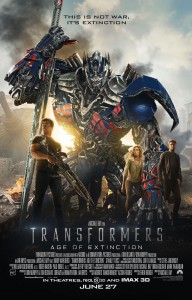 Michael Bay was never really a storyteller. Nor we can say that he ever cared to be one anyway.
Michael Bay was never really a storyteller. Nor we can say that he ever cared to be one anyway.
In his films, powerful chromed machines placed on display in sumptuous shop windows, the story has always been rather a hiccup, something to get through quickly and with little effort in order to switch over it as soon as possible.
In the end what really matters is not how the gears turn and why, but being charmed by the glimmers of light on the shiny surfaces of the machine. The film, for him, comes out well not by putting oil in the engine, but filling the chamois cloth with enough wax to capture our attention.
Yet never, we had so clear a perception of how the story is pointless for Bay, as in Transformers 4. Never it occurred to us to come across a work in which the lines of dialogue or the reasons of the story was so much an annoying hindrance.
In Transformers 4: Age of Extinction, at risk of death is not the humanity put in the middle of the fight between good and bad big robots, but the warm humanity of the story, that one which is naive and a bit stupid because it still needs to capture the characters’ motivations and a Sense in the chains of causes and effects as events unfold.
In the new habitat of the block-buster which throws in the towel and says openly that it no longer need terms of credibility with its own viewers, what mostly remains is a continued vertigo caused by a gradual loss of center.
Everything happens simply because it has already happened elsewhere, each story takes shape because it is a repetition of what has already been told on other occasions. Sequel, prequel, remake become, in Bay’s act of directing, obsolete categories because the story is not the goal of the author, but the hurdle that you have to jump to move forward. And in the movie what matters is not the direction, which usually defines something to be pursued, but the jump itself which becomes the expression of a need to overcome, in which what matters is that the pole be raised an inch each time.
Ultimately, Transformers 4 is exactly the same as the third, it has the same savage fury of the second, it is the same buddy movie as the first. It has the same plot Armageddon had and, in the end, it shares with that movie even the same characters. What matters now – as in the metamorphosis of the trucks that become robots – is not the substance, but its ability to reshape itself.
Transformers (the brand) is the perfect metaphor for Bay’s poetical world: continuous and convulsive movement, a virtual roller coaster of the new digital paradigm.
This time, however, it seems that the bar has been raised too high. This time the fast dialogues that are useful to tell the public that the scene in Chicago is over and now you are moving to China, get so really annoying that you would rather do without them. They act as splints of an old way of making films that is still too tied to our need for narrative.
And the loss in the cast of Shia LaBeouf is felt maybe a little too much.
